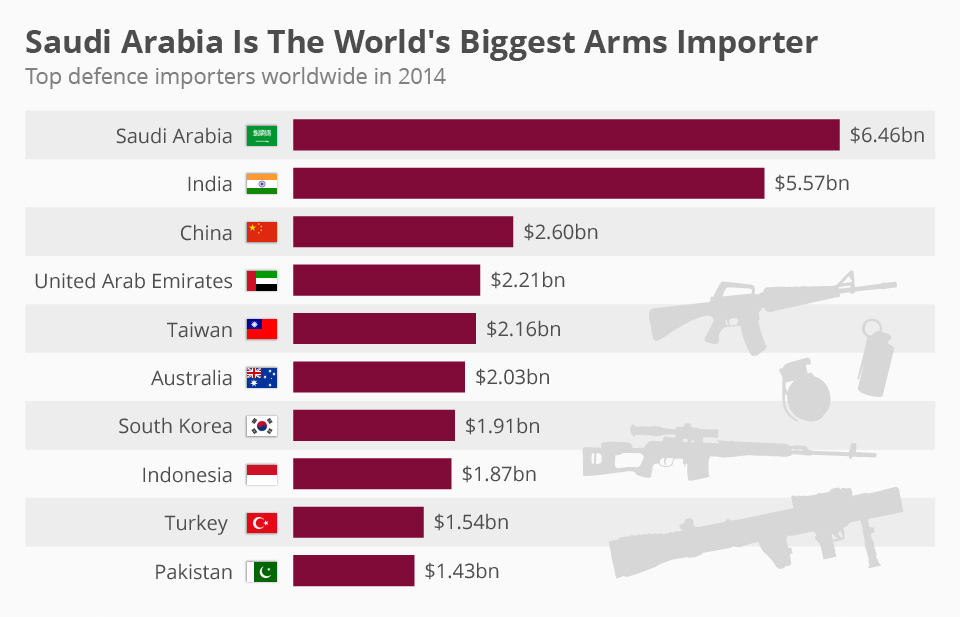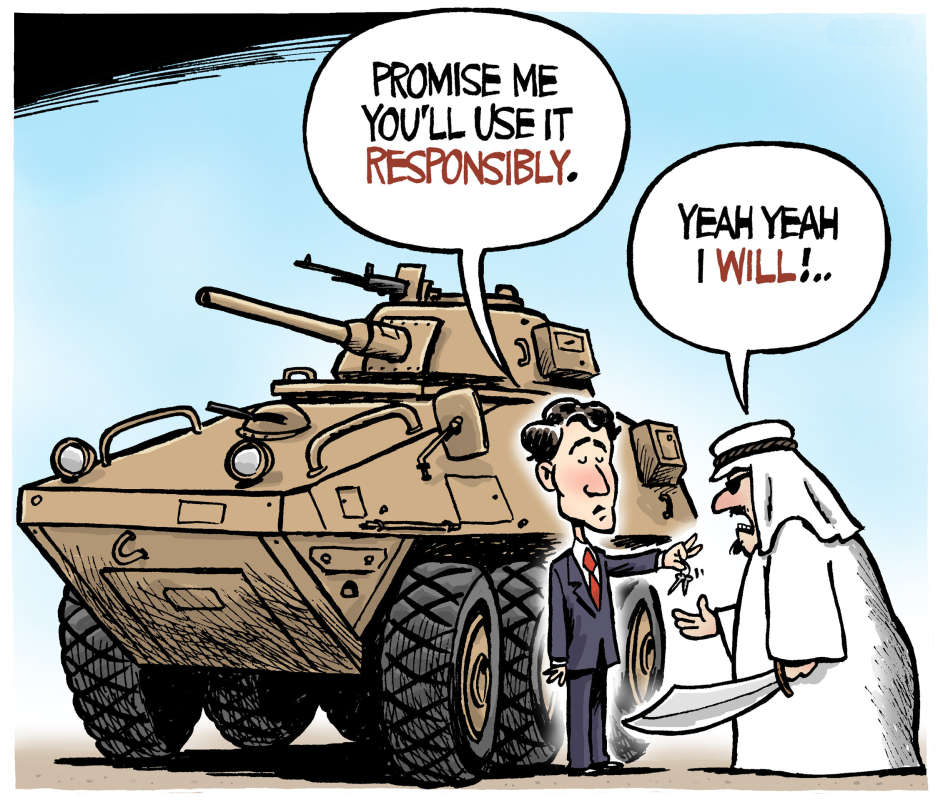



 Ayman Ahmed
Ayman AhmedGripped by multiple crises, the Bani Saud think buying more weapons from the West would get them security. This is likely to hasten their downfall.
If weapons purchases could make a country strong, the Bani Saud-ruled Kingdom would be the superpower of the Muslim East (aka the Middle East) region. The reality is very different. Despite purchasing hundreds of billions of dollars worth of weapons over the last decade, the Saudi rulers act like frightened mice scurrying from one hole to the next in a desperate attempt to try and save their skin. They have had little or no success; all they can think of is purchase more weapons as if these will buy them safety and security.
Bani Saud’s war on Yemen has been an unmitigated disaster even if it has inflicted massive suffering on the Yemeni people. The deliberate targeting of schools, hospitals and even funeral gatherings resulting in the deaths of thousands of innocent people, among them women and children, have led to calls for international investigation that could lead, potentially, to war crimes charges.

There is equally bad news from Syria and Bahrain even though in the latter, the Khalifa regime still remains entrenched in power. Attempts by the Saudi regime, together with its imperialist and Zionist masters to engineer the overthrow of President Bashar al-Asad by unleashing mercenaries on the country have failed. The Saudi regime also released rapists and murderers from prisons and sent them to Syria to fight there in hopes of bringing down the government but nearly six years of bloodletting has not achieved much. Instead, al-Asad’s hand has been strengthened as people are forced to choose between him and the throat-slitting mercenaries.
So what do Bani Saud intend to do about these failed policies? Well, purchase more weapons. This is what they are currently negotiating with the US and Britain. Having purchased more than $85 billion worth of weapons from the US during the eight-year presidency of Barack Obama, Riyadh and Washington are now negotiating another deal worth $115 billion. American weapons’ manufacturers are extremely pleased. Washington’s policy of destabilizing the region and therefore scaring these illegitimate regimes into purchasing more weapons is on track. Britain and France act as junior partners in the Middle East arms bazaar.
Interestingly two European countries — Germany and Sweden — have cancelled arms contracts with the Saudi regime because of the latter’s atrocious human rights record both at home and abroad. True, these do not involve huge sums like those with the US and Britain, but the fact that Germany and Sweden showed some concern is encouraging. This also stands in contrast with the $15 billion (Canadian) arms deal that Canada signed. Despite claiming to champion human rights and putting up a softer public face, the new Liberal Government has refused to cancel the Saudi arms deal.

True, it was signed by the now ousted and much hated Conservative government but the contract clearly stipulates that it cannot be used against civilians and only for defence purposes. The Saudi regime has used these weapons against its own Shi‘i population in the east of the country as well as against the people of Bahrain who have been struggling for their basic rights for many years against an oppressive minority regime. Yet the new “sunny ways” Liberal government is quite happy to supply an oppressive regime more lethal weapons.
These concerns have heightened in the wake of the Saudi assault on Yemen that has been pounded since March 2015. Tens of thousands tons of bombs have been dropped on that impoverished country and more than 10,000 civilians have been killed as a consequence. The Saudi regime has deliberately targeted civilian infrastructure — schools, hospitals, factories, and homes — in a relentless campaign to force the Yemeni people to surrender to Saudi diktats. To their credit and despite paying a huge price, the people of Yemen have refused. Even the UN, which remains quite circumspect in matters pertaining to Saudi Arabia, has called for an independent international investigation into civilian deaths in Yemen. These could lead to war crimes charges against Saudi rulers.
Western regimes make loud noises about alleged human rights abuses in countries whose governments they do not like, primarily because the latter wish to pursue independent policies. When it comes to Western puppet regimes, no such concern is expressed. In the unlikely event of uttering a few words of concern, these are set aside for the sake of selling them weapons. Huge profits are made in selling arms to despotic regimes. Closely related to this is the business of destabilization of the region so that Western supplied stockpiles are depleted in wars necessitating the purchase of more weapons.
This is what is happening with Saudi Arabia. In the 20 months since Riyadh unleashed its murderous wares on Yemen, its stockpiles have been depleted. Enter Washington to replenish these weapons. This makes the US complicit in Saudi war crimes. While at the present time there is little prospect of Saudi rulers being hauled to face war crimes charges, it cannot be ruled out entirely. If the Saudi regime does not comply with American demands or carry out Washington’s orders, they may face a fate similar to the one that befell the former Iraqi tyrant Saddam Hussein or Colonel Muammar Qaddafi of Libya who was publicly lynched by US-backed terrorists in October 2011. Friendship with America carries a steep price.
William Hartung of the US-based Center for International Policy, who authored the September 7 report about the $115 billion arms sale offer to Saudi Arabia, called on Washington to use its leverage with Riyadh to end its murderous policy in Yemen. “Pulling back the current offer of battle tanks or freezing some of the tens of billions in weapons and services in the pipeline would send a strong signal to the Saudi leadership that they need to stop their indiscriminate bombing campaign and take real steps to prevent civilian casualties,” Hartung said.

According to the Control Arms Coalition, a grouping of some 100 organizations that is campaigning against arms sales, Britain, France and the US are violating the 2014 Arms Trade Treaty by exporting conventional weapons to a country [Saudi Arabia] engaged in war crimes. Despite raising such concerns, Britain’s leading arms maker, BAE Systems, announced last month (October 6) that it was holding talks with Riyadh to secure a multi-billion-dollar arms contract. “Discussions between BAE Systems, the UK government and Saudi Arabia are progressing.”
Under the terms of the contract, the multinational aerospace and electronics giant will provide training, support, and upgrades for the Hawk aircraft Britain has sold to the Saudis. It also hopes to sell 48 Eurofighter Typhoon jets to the Saudis for a reported £4 billion (approx. $5 billion) under a separate deal. Such massive deals are being negotiated while British lawmakers from a powerful committee expressed serious concern in September about evidence that British-supplied weapons had been used in Yemen in violation of international humanitarian law. “The weight of evidence of violations of international humanitarian law by the Saudi-led coalition is now so great, that it is very difficult to continue to support Saudi Arabia,” the Committee on Arms Export Control (CAEC) said.
Such concerns expressed by a powerful parliamentary committee have not acted as a deterrent to the British government’s sale of weapons to oppressive regimes. Instead, British ministers as well as members of the monarchy have been frequent visitors to these countries. Britain’s Prince Charles, who is touted by many Muslims as a Muslim-friendly prince, has been a frequent visitor to Bahrain. It has not bothered him in the least that the Bahraini regime has been involved in massive human rights abuses. His wife Camilla has accompanied him on such jaunts. The new British Prime Minister Theresa May has dismissed criticism of these regimes (Bahrain and Saudi Arabia) and defended British arms sales to both.
The only exception to this near-universal chorus of support for oppressive monarchies has been the leader of Britain’s Labour Party, Jeremy Corbyn. Addressing the Labour Party Conference in Liverpool on September 28, he announced that where there are credible reports of human rights abuses or war crimes being committed, British arms sales would be suspended. Corbyn said this would start with Saudi Arabia, a regime that had been accused by the UN of indiscriminate bombing of civilians in Yemen with weapons supplied by the West.
“So, today, I make it clear that under a Labour government, when there are credible reports of human rights abuses or war crimes being committed, British arms sales will be suspended, starting with Saudi Arabia,” he announced. It is yet to be seen whether a future Labour government would be able to uphold this principle. In the meantime, the Saudis continue to kill innocent people in Yemen as well as supply weapons to the mercenaries in Syria.
